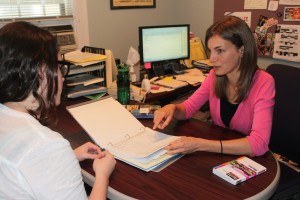When the end of a student’s study abroad trip approaches, many wish they could stay a little longer, but most don’t realize they can.

St. Thomas study abroad adviser Sarah Huesing said the process to extend a student’s stay is simple, but students rarely take advantage of the option.
“It’s something that happens once or twice every year but not in large numbers,” Huesing said. “Usually for a semester… one to two percent decides to extend their stay.”
St. Thomas sophomore Lindsey Landgraf, who has been approved to extend her stay in Cape Town, South Africa, said she wanted to stay longer to develop her headband business and spend more time with the people she’s met.
“I’ve been getting to know so many people here that I absolutely love,” Landgraf said. “I’ve literally developed like family members here.”
The first step in extending a study abroad trip is contacting the St. Thomas Office of International Education to get the extension approved.
“From the St. Thomas perspective, the student is already approved to study abroad. So… it’s fine if they want to stay for another semester,” Huesing said.
Senior Brent Reid studied abroad in New Zealand and said if he would have known more about the extensions, he would have considered staying for a longer time.
“Study abroad was one of the best things I’ve done in my life,” Reid said. “When I was leaving, it didn’t feel like it was over. It could have been longer.”
Reid said his decision would have come down to his personal finances, but Huesing said students who decide to extend their stay also face logistical challenges that depend on the country and program.
Students might not receive an extension because some programs have a limited number of students who can be accepted.
“If the program’s already full for the following term, maybe they wouldn’t be able to stay,” Huesing said. “The limited number of spaces depends on the program.”
Huesing said that another challenge students face is working with St. Thomas to get their next semester’s classes approved to fulfill specific requirements without the benefit of meeting face-to-face with professors.
“When they’re on campus and they can actually meet with faculty to get courses approved, it can be an easier process,” Huesing said. “Doing that over email can be sometimes challenging, especially if there’s a huge time difference and those sorts of things.”
Landgraf is an example of a student who ran into challenges while trying to extend her trip because she missed the St. Thomas scholarship deadline.
“You’re not always up to date with what’s going on with St. Thomas in terms of study abroad,” Landgraf said. “You really have to decide pretty early if you’re going to stay.”
Landgraf said she chose a semester program because she wanted to test the waters before committing to a year away from home, but she always kept the option of staying longer in the back of her mind.
“I thought, ‘I’m going to go; I’m going to see this place. I’m going to see if I truly love it, and then I can always extend,’” Landgraff said.
Huesing said Landgraf’s method of testing the waters is common because being gone for a year can be intimidating, and students decide to extend for a variety of reasons.
“Once students get on site and get adjusted and start speaking the language and that sort of thing, the idea of staying for a year all of the sudden becomes a little bit easier,” she said.
Huesing said that students studying abroad over January term cannot extend their stay because the study abroad extensions are only offered to students who plan to extend their study in the same location.
For students traveling in the fall and spring, Landgraf said they should take advantage of the opportunity to extend their stay.
“You can do it; it’s cost effective, and you’re in supportive environments,” Landgraf said. “I would definitely recommend it to anyone.”
Huesing agreed and said she would most definitely recommend extended stay for St. Thomas students who can make it work financially and academically.
“Study abroad is a really fantastic experience,” Huesing said. “Most students wish they could stay longer; so if they can make it work, we’d like to help them.”
Heidi Enninga can be reached at enni5264@stthomas.edu.

